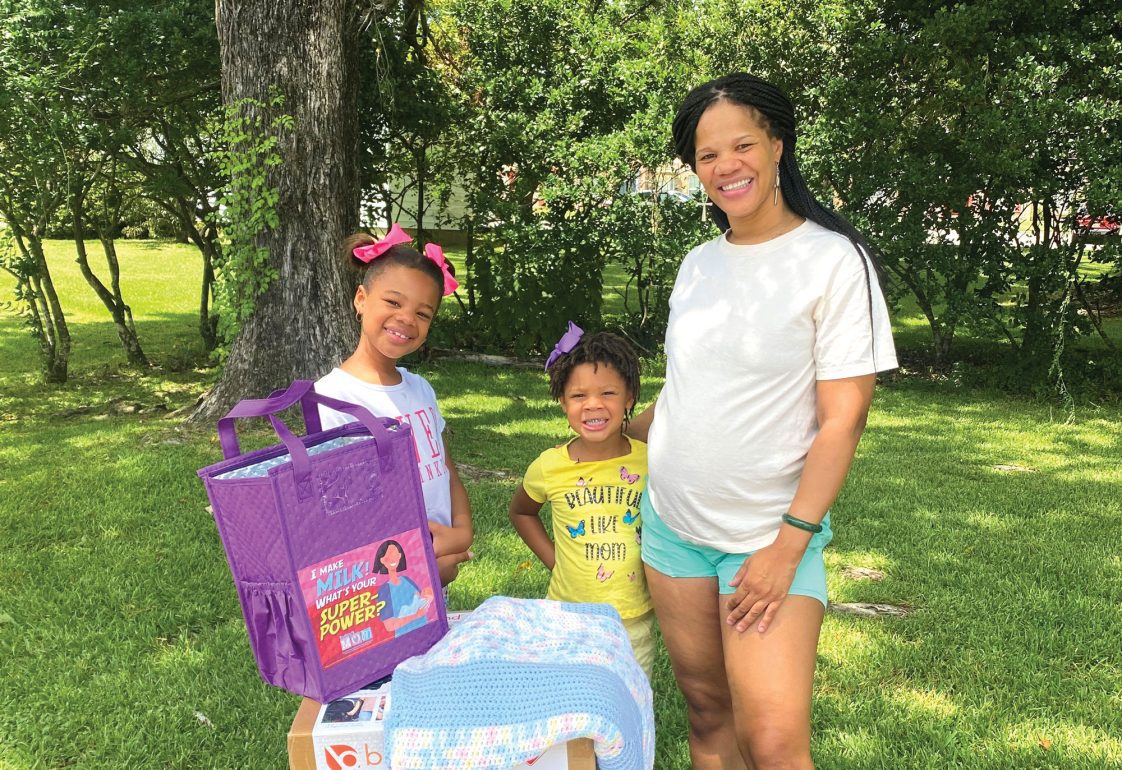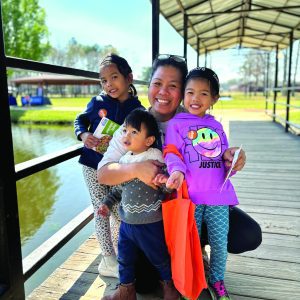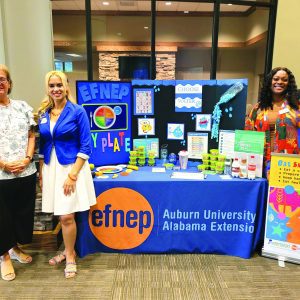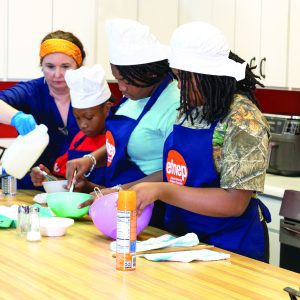Expanded Food & Nutrition Education Program (EFNEP)

AU EFNEP
Expanded Food and Nutrition Education Program Educators across Alabama provide free, hands-on education to families, youth, and pregnant women and teens with limited resources.
In 2024, AU EFNEP served 7,601 adults and youth across 34 counties. Participants in AU EFNEP classes gain the knowledge and skills necessary to make healthy meals at home, save money at the store, and be more active throughout their daily lives. AU EFNEP is funded by the United States Department of Agriculture National Institute of Food and Agriculture.
Impacting Communities by Reaching People
Adults Making Positive Changes
- 97% improved diet quality
- 93% improved food resource management
- 76% improved physical activity
- 77% improved food safety
Youth Success
- 90% chose more foods according to federal dietary recommendations
- 68% increased physical activity throughout their day
- 63% used safe food handling practices more often
- 51% improved their ability or knowledge of how to prepare simple, nutritious, affordable food
Highlights
AU EFNEP Educators are helping prepare the next generation. 54% of youth participants were in grades 6-12, with 16% of those in grades 9-12. AU EFNEP also helps students learn necessary life skills.
Adult participants ate more health-promoting nutrients by the end of their education, including fiber, calcium, vitamin A, vitamin C, and folate. These nutrients are the building blocks of a healthy diet.
“I’m glad I decided to take these classes. It has helped me with grocery shopping, meal planning, and saving money when I cook at home. I love all these recipes; they are so simple to make!” – Adult Participant, Macon County
“My husband and I recently visited our doctor, and both of us have lowered our blood sugar and lost a total of 16 pounds due to changing from fast-food to home-cooked meals and being more active.” – Adult Participant, Dallas County
“My kids enjoy going with me to the farmers market to see what fresh fruits and vegetables are available. They love eating fruit as a snack and like to select new fruits to eat. They also like the water recipes EFNEP has given me. They did not like drinking water until tasting my fruit-infused water recipes.” – Adult Participant, Dallas County
“These recipes are delicious, cheap to prepare, and easy to make. I prepared the recipe for my kids. We had taco night!” – Adult Participant, Wilcox County
“I feel confident I can afford to buy myself healthy groceries when I leave for college.” – Youth Participant, Houston County
- EFNEP is fun for the whole family!
- AU EFNEP Educators love to share their knowledge with the community!
- Lesson reinforcements help participants put their new skills into practice at home.
- Students enjoy hands-on learning in AU EFNEP classes!
Educators in Action
I Already Have All These Ingredients
A Macon County EFNEP participant shared with EFNEP Educator Mary Bedell that she has a difficult time making food last, preparing healthy meals, and meal planning. She said she usually looks for meals and snacks that are quick and easy to prepare. “My kids eat lots of noodles, cookies, and chips.” She joined EFNEP classes so she could help her children eat better and prepare meals for her family. Throughout the class, Mary encouraged her to check her cabinets and make a shopping list and meal plan so she would be able save time and money.
The participant was excited to try the tortilla pizza recipe. She said, “I already have all these ingredients at home!” She was empowered and motivated by the fact that she could make an easy pizza recipe from what she had at home. She said, “This is an easy recipe. I’m going to start checking my cabinets before I go grocery shopping. I may already have the things that I need.”
– Mary Bedell, EFNEP Educator, Macon County
“This is an easy recipe. I’m going to start checking my cabinets before I go grocery shopping. I may already have the things that I need.” – Adult Participant, Macon County
Building Healthy Habits
One Montgomery County EFNEP participant joined the AU EFNEP program to lose weight, learn to meal prep, and find ways to incorporate fruits and vegetables into her diet. She had issues with textures of fruits and vegetables, and she had some health issues that limited her walking and mobility. She wanted to find ways to exercise without feeling overwhelmed and having to go to the gym.
After completing the program with AU EFNEP Educator Jovonna Gunn, this participant was able to incorporate strawberries and bananas into a smoothie with vegetables and enjoy it. She learned how to pick fruit and vegetables that could blend well and create a new texture that she could enjoy. She also started to do online exercise videos. During the final class, she mentioned that her clothes fit better, and she had started walking more with the help of her children.
– Jovonna Gunn, EFNEP Educator, Montgomery County
Changing for the Better
AU EFNEP works with many working mothers who juggle the demands of a busy schedule. One Wilcox County EFNEP participant found that her diet mainly consisted of processed foods and sugary snacks, leading to low energy, weight gain, and declining overall health. She wanted to make small changes but didn’t know how. She was sitting in the doctor’s office one day when she noticed an AU EFNEP flyer and decided to reach out.
Through the program, she learned about the importance of balanced nutrition, focusing on whole foods like vegetables, lean proteins, and whole grains. With guidance, she began to practice portion control, incorporate healthy fats into her meals, and drink water to stay hydrated. Small changes over time resulted in significant improvements to her energy levels, mood, and weight management. Her success extended to her family as well, setting a positive example at home. She learned how to plan her meals better and make healthier food choices, even with a busy schedule, which helped her stay on track and avoid fast food or processed meals. She made physical activity changes by walking and doing yoga and once she began to exercise, she started to have more energy each day.
– Kyondria Timmons, EFNEP Educator, Wilcox County
Preparing for a Healthy Future
EFNEP Educators build relationships with students every week. During Houston County Educator Gracie Woodall’s time at a local school, she had a participant who was a senior and would soon leave his parent’s home to move to college. Throughout the lessons that EFNEP offers, she covered healthier and budget-friendly food options. AU EFNEP helps prepare students to be successful as they move out on their own. During the final class, this participant shared how much he learned during the classes. He said, “I feel confident I can afford to buy myself healthy groceries when I leave for college.”
– Gracie Woodall, EFNEP Educator, Houston County
Trying New Things
One youth participant in Fayette County didn’t like to try new foods or eat vegetables when he began classes. AU EFNEP Educator Kristi Baggett taught this student’s class MyPlate, how to use nutrition facts labels, and how to make healthy food and drink choices. Over the course of the class, this student became more open to trying new foods. Along with his classmates, he tried each of the healthy foods Kristi brought, including fruits, yogurt, smoothies, and salad. He began eating vegetables as a snack and including fruit in his snacks and meals every day. Besides these changes, he decreased his sugary drinks over the course of programming, going from drinking sweet tea every day to having it only occasionally.
– Kristi Baggett, EFNEP Educator, Fayette County
Theresa Mince, Extension Specialist, Family and Consumer Sciences, Auburn University
New March 2025, EFNEP 2024 Impact Report, FCS-2851
Past Reports
- EFNEP 2023 Impact Report, FCS-2812
- EFNEP 2022 Impact Report, FCS-2730
- #EFNEPWorks – 2021 Impact Report, FCS-2671
- EFNEP Annual Report 2019–2020, FCS-2507
The Alabama Cooperative Extension System (Alabama A&M University and Auburn University) is an equal opportunity educator, employer, and provider. If you need a reasonable accommodation or language access services, contact Amy Sorter at als0023@aces.edu.





